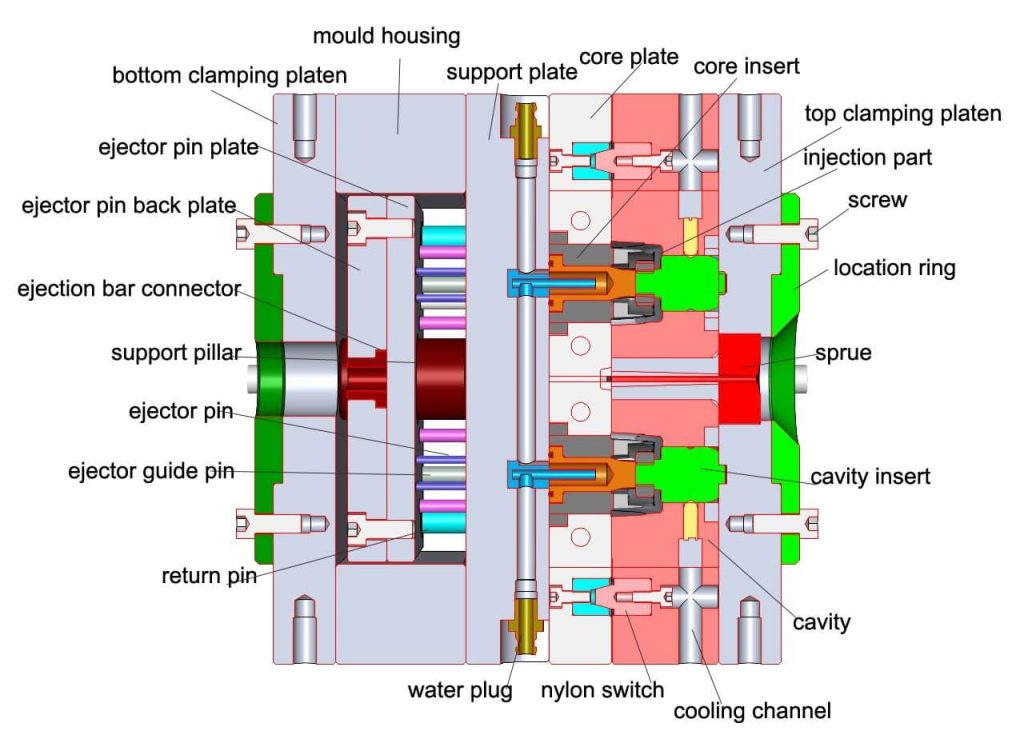Why do some molds perform better than others?
Plastic molds are very complex to construct. It requires coordination of lots of different factors, from designing, machining, assembling, testing, and finally into the service. Lots of factors affect the quality of the mold. We need to comprehend these factors to make the mold building better.
Steel
Steel is of the utmost importance for molds (molds are made from steel). It is the base for everything.
In this regard, choosing the right steel material is very important. Tool steels come in many forms, including D3, A2, O2, D2, and even H11, 1.2344, H13 and others. You can choose the one that is the right one for you by focusing on the points below.
steel materials are needed to complement injected plastics , like corrosion resistance and polishing are important requirements for some kind of steel.
If the steel function is adequate, then it is sufficient. Getting much higher steel performance for a relatively big amount of money is unnecessary.
Also very important is the surface treatment. Nitrogen treatment can increase the steel’s surface hardness, lengthen its surface life and make its performance better. Electroplating can improve mold steel’s surface hard performance if it is electroplated.Plastics that need high luminance and corrosion resistance can be electroplated to enhance its performance.
Structure Design
A good structure design not only takes into account the material property of the product, such as shrinkage ratio, temperatures involved in molding, and so on, but also needs to consider the water cooling layout.
Having a good structure design can enhance the mold’s productivity life and produce products more economically. That is an important factor for achieving the highest efficiency and lowering the cost.
Plastic Mold Craftsmanship
Molds do need good craftsmanship for them to function correctly. Great craftsmanship ensures that the cost and working time are kept at an optimal level, while incorrect quality results in the mold becoming brittle.
Besides, the poor quality mold building process will decrease the life and effectiveness of the plastic mold, causing it to break and cause damage in the process of injection molding.
Plastic Mold Polishing
Polishing, which is the last step in the mold-making process, is also important and indispensable for the action of the mold, particularly for mold release.
Although there are many good mold production companies out there, their production is not always good since polishing is not well. Further, the resistance is sometimes too large and the demolding is difficult. Even the top face has a cracked or white surface.
Assembly of Plastic Mold
Mold assembly is similar to the assembling of a machine or a piece of equipment. Each component and each screw must work together in harmony, otherwise serious problems can arise, such as defective products, production interruptions or mold damage, resulting in scrap.
Therefore, the assembly process needs to be conducted with great attention to detail. During the assembly process, make sure that all channels and holes were cleaned thoroughly. Make sure to expel all the iron filings inside the channels and holes.
Plastic Mold Cooling
Anyone who has worked with molds for years knows how important it is to keep molds max cooled. Due to rising wages, it is unimaginable how much profit can be made by reducing the injection cycle by one second during mass production.
However, if the manufacturing cycle increases and even if there is no effective control of the rise in temperature, it will lead to the mold being way too hot to work properly, ultimately causing the mold to deform and become unusable.
Therefore, it is imperative to take into account not only the layout of water, but also its channel diameter and interconnection with other water channels. So, this is especially crucial.
Maintenance of Plastic Mold
Mold maintenance is primarily performed during and after production.if they are not regularly used or properly maintained they will deteriorate and eventually be scrapped.
Therefore, regular maintenance of the mold is vital after each use, specifically the corrosion protection of the molding part and the corrosion protection of the main moving parts.
Since the mold needs cooling water for production, it may be filled with water during the assembly or installation process. As such, it is crucial to ensure that the mold is dry before applying an oil coating to protect it.
These details must be focused on and done properly to make sure a good mold is produced in order to be able to produce good products

